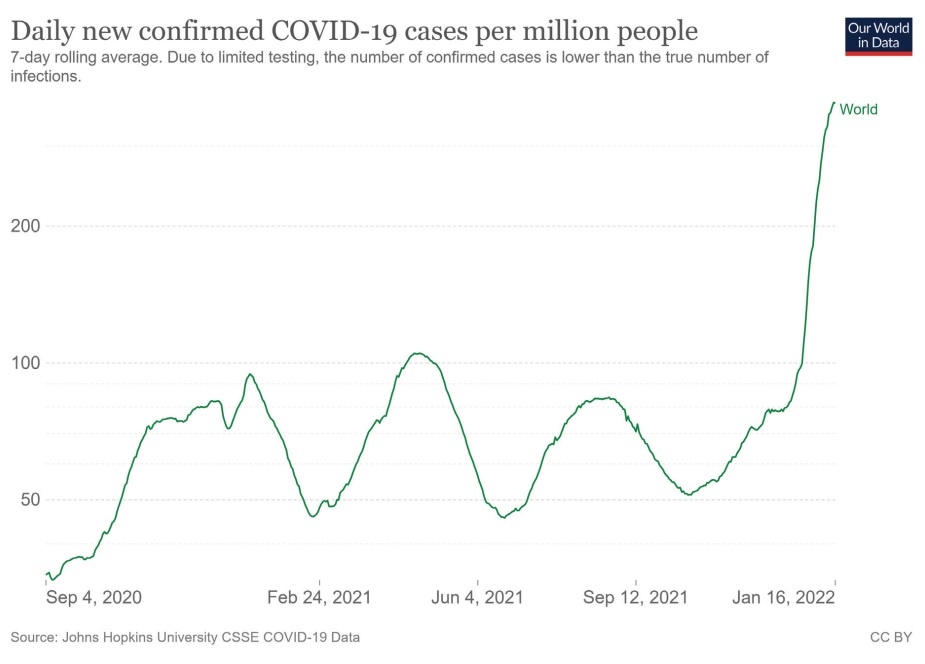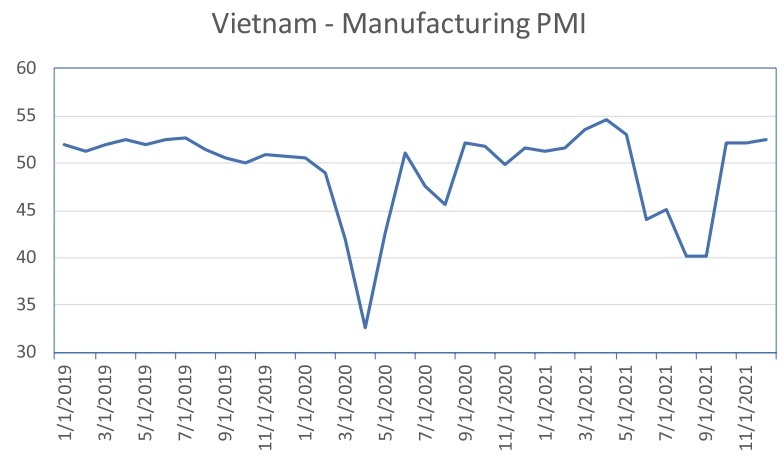Bracing for impact of Omicron variant
 |
| Patrick Lenain, assistant director at the Organisation for Economic Co-operation and Development |
The coronavirus known as COVID-19 has already killed 5.5 million worldwide, and data based on excess deaths put the number of fatalities at between 12 and 22 million, making this pandemic the deadliest in recent times.
The new Omicron variant is extremely contagious, but also less deadly than previous variants. We could therefore soon be in a situation where the virus will continue to circulate without sending waves of sick patients to hospitals. In other words, the pandemic will become endemic.
Vietnam should prepare for a wave of Omicron (see Figure 1). Like elsewhere, many people will catch it. Medical evidence suggests that most vaccinated people will only experience mild symptoms when infected by Omicron. For most patients, three injections protect effectively against hospitalisation, although the jury is still out for some of the vaccines. More good news is that Omicron affects the upper organs of the respiratory system, thus reducing the risk of severe lung damage.
Vietnam can learn from other countries how to manage the Omicron wave. Some have relied on scientific councils to get advice day after day: how should vaccinations be prioritised? Should vaccination and testing be required in workplaces? Should contact cases be subject to strict quarantines? Should schools be shut down when a single pupil is tested positive? Should borders be reopened to international arrivals?
This myriad of decisions should be based on scientific knowledge and applied nationwide. Rather than allowing each province to set its own rules, nationwide rules would provide simplicity, clarity and effectiveness.
 |
Disruptions and rebounds
After two years of disruptions, all countries seek to resume normal economic operations. However, supply bottlenecks remain widespread. Factory shutdowns and mobility restrictions have disrupted logistics networks around the world. Health precautions are blocking container traffic in ports, airlines have reduced their freight transport capacities, truck drivers are in shortage – all resulting in high shipping costs and delayed deliveries, with spillover effects through supply chains and disastrous impacts for retail sales.
These disruptions have hit automobile production, which remains 25 per cent below pre-pandemic levels, mostly due to shortages of semiconductors. Consumer demand for new vehicles is strong, but carmakers lack sufficient supply to satisfy buyers.
Depending on car models, buyers may have to wait between two and six months. In the United States, the most popular pickup trucks face delivery times of up to nine months. Consumers have switched to used cars, which are immediately available, but this has sent their prices soaring – in the US, prices of used cars and trucks increased by 37 per cent in December over one year.
Supply chain difficulties have hit multinationals. Shortages of electronic equipment and blocked shipments in transit have disorganised the just-in-time model at the core of global value chains. With the virus likely to become endemic, investors are taking a second look at their supply chains and seeking to move to locations able to provide a steady and reliable flow of industrial components. For countries like Vietnam, future prosperity will depend on striking the right balance between health imperatives and economic development.
Vietnam has not remained exempt from severe economic disruption. The Vietnam manufacturing purchasing manager index (PMI) index fell sharply during the first COVID-19 waves of March-May 2020 and once again sharply in mid-2021 (see Figure 2). Factories shut down to contain infections, but this disorganised production and shipments of goods.
 |
Some companies adopted a stay-at-work approach to stop infections. But this came at a high cost in terms of wellbeing, mental health, and additional spending occurred by employers required to provide meals, protective equipment, and sleeping mats. Various shipments were delayed with impacts on global sales in markets where Vietnam is a key supplier – such as smartphones, shoes, microchips, and automobile components.
Fortunately, the infection rate in mid-2021 slowed and Vietnam’s economy has rebounded. Real GDP growth increased by 5.2 per cent in the fourth quarter from a year ago, after authorities lifted most mobility restrictions. The PMI manufacturing index has returned above 50 during the last three months of 2021, which signals an increase in activity. Exports largely explain the turnaround of activity. In December 2021, Vietnam’s exports of goods reached the historically high level of $34.52 billion as factories were catching up on delayed shipments. Exports to large markets, such as the United States and China, recorded very strong increases.
Recent data confirm an ongoing expansion of Vietnam’s exports, with an increase of 19 per cent in 2021 from the previous year. Thanks to signed trade agreements and strong exports, the external balance of goods recorded a trade surplus of $2.54 billion in December. As consumers in advanced economies were returning to shopping centres with a high demand for goods, Vietnam was able to boost its shipments and increase its market share, especially in the United States. Strong foreign direct investment also shows that the country remains attractive to multinational companies.
Dealing with Omicron
Further growth at a strong pace is, however, not certain. A new wave of infections is about to hit Vietnam – it is just a matter of time. Official projections of GDP growth of 6-6.5 per cent in 2022, after only 2.58 per cent last year, will require careful management of new infection waves.
It is possible, like in other countries, to avoid repeating the large disruptions seen in the past. With good medical advice, close coordination between provinces, and predictable rules, it will be possible to keep the economy largely open. Long-lasting shutdowns of businesses cause waves of bankruptcies and under-investment – hence they should be avoided. Lengthy quarantines of workers undermine their skills, reduce their motivation, and encourage them to focus on family care rather than returning to salaried work. Economic reopening should remain the priority.
Despite being a late starter, Vietnam has run a very successful vaccination campaign and now ranks internationally high. Yet, more could be done. Making vaccination mandatory for all citizens is controversial, but partial mandates are now a common practice around the world: some governments have mandated full vaccination for healthcare workers, active-duty military, and public officials as well as government contractors. Some businesses mandate workers to be vaccinated if they go to the workplace or are in contact with customers, or otherwise lose their job. This includes companies such as Citigroup, Delta Airlines, McDonald’s, Google, Microsoft, and Walmart.
In many countries, vaccine passports have been introduced or are being discussed. These passports certify that the holder is fully vaccinated and must be presented to get access to public places such as restaurants, movie theatres, concert halls, hospitals, schools, universities, public buildings, and trains and planes.
Another approach to increasing vaccination rates is to provide incentives to unvaccinated people – a wide range of incentives have been used around the world such as cash payments, gift cards, free meals, free lottery tickets, and free access to amusement parks. Information campaigns about the benefits and risks of being vaccinated are also helpful – such as television advertisements.
For those who are fully vaccinated, Omicron is less lethal than previous variants. Governments have therefore eased the rules for vaccinated individuals who test positive. In France and the United Kingdom, isolation periods were cut to seven days, with no requirement to test negative upon exit. Vaccinated contact cases need not go into isolation. Schools do not have to close down when a vaccinated pupil is tested positive, though children in the same class need to undergo several tests to make sure they are not infected.
The pandemic has also not stopped international competition between emerging market economies. Vietnam is admired for its business-friendly conditions, multiple international trade agreements, and motivated workforce. But other emerging market economies also offer auspicious environments and seek to attract investment. Careful management of future pandemic waves, based on sound scientific advice, will go a long way to convincing investors that Vietnam is the right place to do business.
What the stars mean:
★ Poor ★ ★ Promising ★★★ Good ★★★★ Very good ★★★★★ Exceptional
Related Contents
Latest News
More News
- IP alterations shape asset strategies for local investors (January 22, 2026 | 10:00)
- 14th National Party Congress: Vietnam - positive factor for peace, sustainable development (January 22, 2026 | 09:46)
- Japanese legislator confident in CPV's role in advancing Vietnam’s growth (January 22, 2026 | 09:30)
- 14th National Party Congress: France-based scholar singles out institutional reform as key breakthrough (January 21, 2026 | 09:59)
- 14th National Party Congress: Promoting OV's role in driving sustainable development (January 20, 2026 | 09:31)
- 14th National Party Congress affirms Party’s leadership role, Vietnam’s right to self-determined development (January 20, 2026 | 09:27)
- Direction ahead for low-carbon development finance in Vietnam (January 14, 2026 | 09:58)
- Vietnam opens arms wide to talent with high-tech nous (December 23, 2025 | 09:00)
- Why global standards matter in digital world (December 18, 2025 | 15:42)
- Opportunities reshaped by disciplined capital aspects (December 08, 2025 | 10:05)

 Tag:
Tag:




















 Mobile Version
Mobile Version